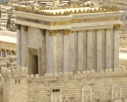 from The
Temple (1633), by George Herbert:
from The
Temple (1633), by George Herbert:
 from The
Temple (1633), by George Herbert:
from The
Temple (1633), by George Herbert:
¶ Mattens.
I Cannot ope mine eyes,
But thou art ready there to catch
My morning-soul and sacrifice:
Then we must needs for that day make a match.
My God, what is a heart?
Silver, or gold, or precious stone,
Or starre, or rainbow, or a part
Of all these things, or all of them in one?
My God, what is a heart?
That thou shouldst it so eye, and wooe,
Powring upon it all thy art,
As if that thou hadst nothing els to do?
Indeed mans whole estate
Amounts (and richly) to serve thee:
He did not heav’n and earth create,
Yet studies them, not him by whom they be.
Teach me thy love to know;
That this new light, which now I see,
May both the work and workman show:
Then by a sunne-beam I will climbe to thee.
|
|
Emily Dickinson copied the second and third stanzas of this poem and put it with her own, where it was found and mistaken for hers (From http://lal.cs.byu.edu/mlists/emweb/199607/19960723-23.html no longer on the Web): When "Bolts of Melody" first came out in 1945 it was "reviewed" in "The Talk of the Town" section of the June 16, 1945 issue of "The New Yorker" magazine. There it was first pointed out that poem number 232, on page 125, "My God, what is a heart?" was really two stanzas from "Mattens" by George Herbert, and not by Emily. It was mistaken for one of hers by Mrs. Millicent Todd Bingham (or Mabel Todd). Dickinson had apparently liked it and jotted it down on a scrap of paper, so it resembled one of her poems. For the Morning Service [in some services called Matins] see Book of Common Prayer 1559, Morning Prayers. Or see a version of the Elizabethan Morning Prayers with George Herbert’s Poems added. Internal and Internet Links to George Herbert’s Reputation and Influence. |
| 1633 Poem Index | George Herbert & The Temple Home Page |